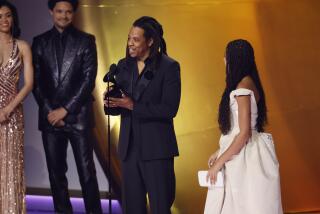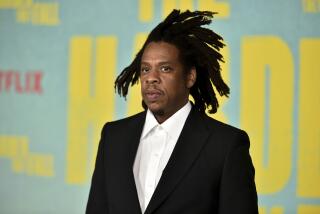Jay-Z loses some gangster cred
- Share via
The concept behind Jay-Z’s new “American Gangster” album was simple. After watching a preview of the new Ridley Scott film of the same name, chronicling the rise and fall of real-life Harlem drug lord Frank Lucas, Jay-Z was inspired to record an entire album in homage. The conceit is shrewd marketing but otherwise, it’s a cursory gesture. The album rarely engages the film’s narrative or characters, save for a few, obligatory references and dialogue samplings.
More important, Jay-Z long ago had built a successful career dramatizing drug lords in his music.
Jay-Z rose to fame off his vivid, crack-era narratives. A former minor drug dealer himself, he’s milked those hustler credentials for every album since. In the Bizarro World of street cred, though, becoming one of hip-hop’s greatest rappers is an accolade Jay constantly downplays. On “No Hook,” he rhymes, “Don’t compare me to rappers / compare me to trappers / I’m more Frank Lucas than Ludacris.” The claim is rather, uh, ludicrous given how, between running a major record label (Def Jam), appearing in national ad campaigns (Budweiser and Hewlett-Packard) and dating a megastar (Beyonce), Jay’s not “more” like ex-drug pushers, current rappers or anyone else for that matter.
The new album arrives less than a year after the relative disappointment of “Kingdom Come,” his “comeback” album after retiring in 2004. “American Gangster’s” naked desire to be a return to street-seasoned form doesn’t quite smack of desperation, but its nod to the movie isn’t matched by an album that feels either cinematic in scope or well-scripted in design.
That doesn’t mean Jay doesn’t display a few flashes of genuine panache and power in musing on “the life.” “Roc Boys” is a energetic rundown of the tools of the hustler’s trade: “Thanks to the duffel bag / the brown paper bag / the Nike box for holding all this cash.” Likewise, on “Success,” his pairing with former rival Nas, Jay’s couplets create a compelling counter-rhythm to producer No I.D.’s screaming organ vamps: “Broad daylight / I off your on-switch / you’re not too bright / good night / long kiss.”
Elsewhere though, some of the production is surprisingly square and listless, especially on “Pray” and “American Dream.” And for a rapper who name-checks Robert De Niro three times, Jay-Z’s own performance is less than riveting. The clever wordplay and agile flow are still there but much of it sounds like something heard before, only better. In the end, “American Gangster” doesn’t inspire passionate derision but it is phlegmatic enough to engender shrugged indifference. For Jay-Z, the latter may be worse.
Of course, most of the 1,000-plus people who saw him perform Tuesday at the House of Blues were anything but indifferent. After all, they paid $150 per ticket to see Jay-Z -- who typically plays arenas -- in an intimate venue.
Taking the stage in “rock star casual” -- black jeans, black tee, high-top Nikes and sunglasses -- Jay, backed by a 13-piece band, adroitly moved through 30 songs in 90 minutes. Of course, the benefit of being Jay-Z is having dozens of chart-toppers to draw from and many of the evening’s selections were major, crowd-pleasing hits.
He also included a five-song set which included Roc-A-Fella label mates Beanie Sigel, Memphis Bleek and Freeway. And because this was West Hollywood, Sean “Diddy” Combs and Jermaine Dupri made quick celeb cameos during the final encore. (No Beyonce, alas).
One third of the playlist came from “American Gangster,” creating an intriguing contrast with Jay-Z’s older material. A few stood out: “Roc Boys” is destined to join his concert repertoire -- the blasts of brass, the catchy chorus (“the Roc boys in the building tonight!”) are too perfect. In contrast, “Pray” felt even more plodding and stilted than on the album, but ironically, for a song called “No Hook,” Jay-Z had the house yelling along with its refrain.
Whether Jay-Z can claim to be the definitive American gangster is debatable; as the definitive American rapper however, the claim is all but uncontested.
More to Read
The biggest entertainment stories
Get our big stories about Hollywood, film, television, music, arts, culture and more right in your inbox as soon as they publish.
You may occasionally receive promotional content from the Los Angeles Times.










